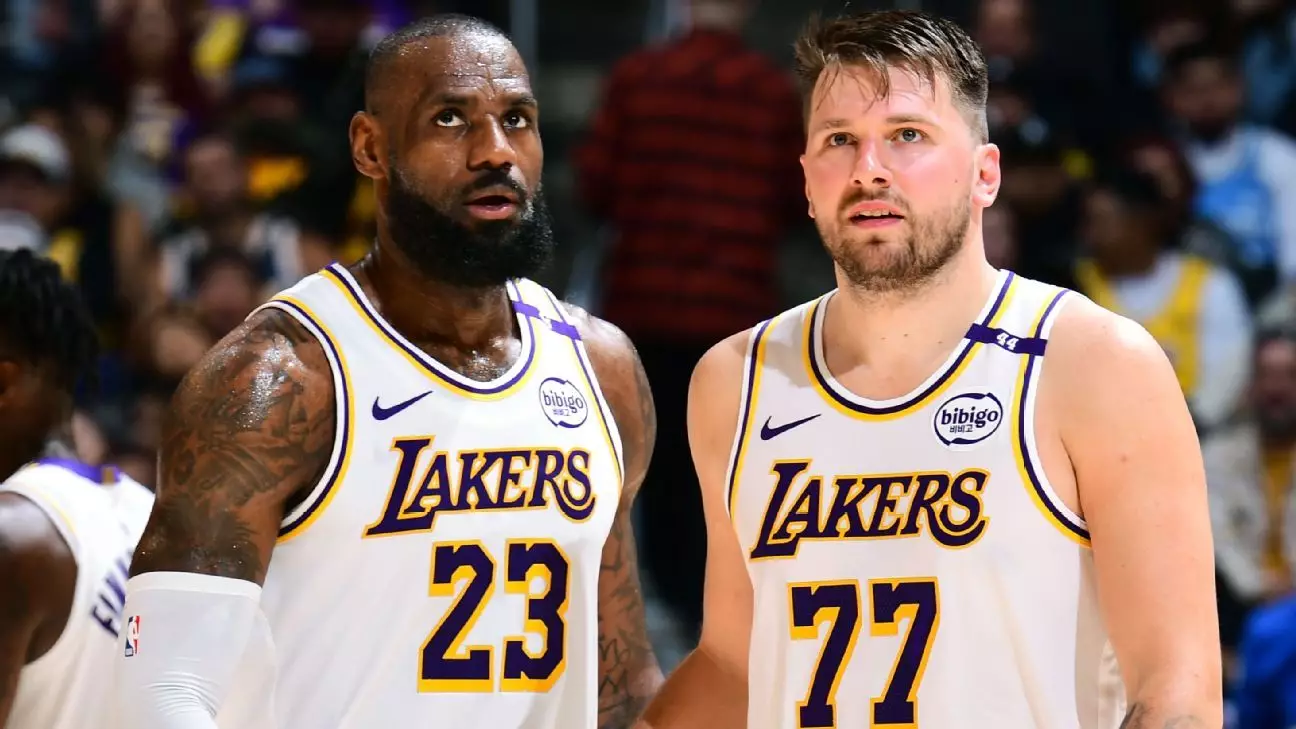Luka Doncic’s recent $165 million extension with the Los Angeles Lakers marks more than a financial milestone; it signifies a pivotal shift in the NBA landscape, especially for the Dallas Mavericks and Lakers franchises. Donning the Lakers jersey, even temporarily, signals the league’s ongoing emphasis on talent, star power, and the relentless pursuit of championship glory. This contract is not merely a testament to Doncic’s individual brilliance but also a declaration of his evolving role as a franchise centerpiece capable of redefining team aspirations.
At 26, Doncic has already demonstrated MVP-caliber performances and elevated his status to one of the league’s most electrifying players. The fact that he received a warm gesture from LeBron James, including a congratulatory call, highlights not only his rising stature but also the burgeoning mentorship dynamic that could transcend individual accolades and drive team success. Such gestures contribute to a narrative where young superstars like Doncic are increasingly recognized as the future and, sometimes, the future of their respective franchises.
In the context of NBA strategy and franchise stability, extending this contract cements Doncic as an anchor. It dramatically shifts long-term planning for the Lakers, especially considering the franchise’s recent tumult and the turbulent relationship with aging superstars. Meanwhile, in Dallas, this move underscores the franchise’s need to reevaluate their own strategies and ultimately accept the challenge of constructing a championship-winning roster around a star who might now view his future elsewhere if circumstances change.
LeBron James: Balancing Legacy and Future Uncertainties
LeBron James’s nuanced stance on his future continues to cast a shadow of intrigue over the league. While publicly supportive of Doncic and the Lakers’ ambitions, James’s recent contract decision—the option to opt into his final year—reveals a layer of strategic ambiguity. His camp’s statement about wanting to compete for championships, combined with his age and career trajectory, paints a portrait of a superstar grappling with the twilight of his career while still desiring to compete at the highest level.
The fact that James and his camp are open about exploring the best path forward demonstrates a realistic, almost philosophical recognition of his legacy. It is rare to see a player of his stature openly discuss the potential for a limited remaining window. There is a palpable tension between loyalty to the Lakers—a franchise he has called home for eight years—and the natural desire to maximize his chances for another ring before retirement.
This ambiguity also acts as a mirror to the broader NBA environment where legacy players are often at crossroads, balancing their historic impact with the practicalities of team-building and roster management. James’s relationship with the Lakers is emblematic of this delicate dance—one where personal ambition and team loyalty must be carefully coordinated. Amidst these negotiations, he continues to be a pivotal figure whose decisions could influence the franchise’s strategy far beyond the next season.
The Future of the Lakers and the NBA’s Power Dynamics
The Lakers’ recent acquisition of Doncic and LeBron’s lingering presence reinforce a broader narrative about the shifting power dynamics within the league. The Lakers are no longer just a storied franchise relying on established legends; they are actively positioning themselves as a competitive powerhouse capable of attracting and cultivating future stars. Their willingness to secure Doncic with a lucrative extension underscores a strategic vision—building a team around young, high-talent players who can challenge for titles.
Yet, beneath this confident exterior lies a layer of uncertainty. The NBA is evolving rapidly, with superstar players seeking the right environment to maximize their potential. The Doncic-Lebron connection exemplifies the changing landscape where mentorship, legacy, and franchise loyalty intertwine. The league seems more fluid now than ever, with alliances constantly shifting and narratives being rewritten on the fly.
The Lakers’ approach suggests a deliberate effort to cultivate a new superstar hierarchy—one built on long-term investments and forward-looking rosters rather than relying solely on aging icons. This could spark a trend where franchises are increasingly valuing nurture and development, emphasizing a transitional phase rather than immediate titles at all costs.
In analyzing Luka Doncic’s contract extension and the surrounding narrative, it becomes clear that this moment signifies more than just individual contract negotiations. It encapsulates a larger movement within the NBA—an era where legacy players like LeBron James are contemplating the final chapters of their careers while paving the way for a new generation to thrive. The Lakers are signaling their intent to remain relevant by stacking stars and nurturing talent, even in the face of uncertainty.
For Doncic, the extension is a proclamation that he intends to be at the heart of this evolving landscape, a torchbearer poised to redefine franchise success. The league’s broader narrative is one of transition—where the old guard makes room for emerging superstars who possess the talent and ambition to carry the sport into the future. As this era unfolds, NBA fans should brace for a period marked by strategic ingenuity, shifting loyalties, and the relentless pursuit of greatness.

